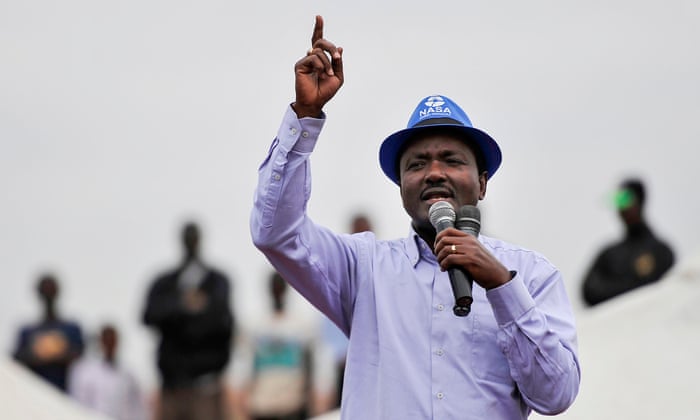Kenyan opposition figure alleges gun and grenade attack on home
Kalonzo Musyoka, a former vice-president, says he was victim of assassination attempt hours after opposition rally

Jason Burke Africa correspondent Wed 31 Jan 2018 14.53 GMT
 A senior opposition leader in Kenya has said unknown gunmen tried to kill him at his home in the early hours of Wednesday, raising the stakes after months of political turmoil.
A senior opposition leader in Kenya has said unknown gunmen tried to kill him at his home in the early hours of Wednesday, raising the stakes after months of political turmoil.
Kalonzo Musyoka, a former vice-president, said gunshots were fired and a grenade detonated at about 1am in what he described as “an assassination attempt” at his residence in the capital, Nairobi.
The alleged attack came after tens of thousands of people defied the authorities to attend a ceremony to swear in Raila Odinga, a veteran opposition leader, as “president of the people” in Uhuru Park in the centre of Nairobi on Tuesday.
Musyoka was to take the oath as Odinga’s deputy president in the mock inauguration but did not attend the meeting.
Analysts said Odinga’s symbolic challenge could lead to fresh confrontations in Kenya, three months after Uhuru Kenyatta won a further five-year term as president in a controversial election rerun. The opposition boycotted the poll, saying it was not free or fair.
“The motive [for the attack] was clearly political,” Musyoka told the Associated Press, describing the blast as “shocking”. There was no independent confirmation of Musyoka’s claims.
Government lawyers described Tuesday’s opposition ceremony as treason and later outlawed the opposition’s National Resistance Movement, with the interior minister, Fred Matiang’i, declaring it to be an organised criminal group. Membership of such a group can lead to imprisonment up to 10 years under Kenyan law.
Authorities had cut live transmission of the country’s top three TV channels to prevent coverage of the mock inauguration.
In a brief speech to the enthusiastic crowd, Odinga, 73, described a “high calling to assume the office of the people’s president of the Republic of Kenya” and stressed his acts were constitutional.
Though many in Kenya are tired of the continuing instability, the large turnout at Uhuru Park may rejuvenate an opposition campaign that had been flagging.
A statement from the government on Wednesday afternoon said the TV networks that were taken off air would remain closed while under investigation. The statement accused the media of “complicity” in the ceremony, which it described as a “well-choreographed attempt to subvert or overthrow the legally constituted government of ... Kenya”. “Co-conspirators and facilitators” in the ceremony would face appropriate legal action, it added.
The turmoil in Kenya was triggered when the supreme court annulled the result of the presidential election in August because of irregularities. Turnout in the subsequent rerun was only 39%, though Kenyatta won with 98% of the vote.
The supreme court was again asked to dismiss the result, but this time upheld Kenyatta’s victory.
Odinga dismissed the October election as “fake” .
Last year, William Ruto, the powerful deputy president, compared Odinga to Joseph Kony, the infamous warlord who has terrorised a swath of east Africa for decades.
“Mr Odinga has chosen to walk away from the democratic arena and says he has transformed his party into a resistance militia or movement … which is unfortunate,” Ruto told the Guardian.
